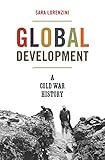Global Development : A Cold War History / Sara Lorenzini.
Material type: TextSeries: America in the World ; 30Publisher: Princeton, NJ : Princeton University Press, [2019]Copyright date: ©2019Description: 1 online resource (296 p.) : 4 b/w illusContent type:
TextSeries: America in the World ; 30Publisher: Princeton, NJ : Princeton University Press, [2019]Copyright date: ©2019Description: 1 online resource (296 p.) : 4 b/w illusContent type: - 9780691180151
- 9780691185569
- 909.825 23
- D843 .L6 2020
- online - DeGruyter
- Issued also in print.
| Item type | Current library | Call number | URL | Status | Notes | Barcode | |
|---|---|---|---|---|---|---|---|
 eBook
eBook
|
Biblioteca "Angelicum" Pont. Univ. S.Tommaso d'Aquino Nuvola online | online - DeGruyter (Browse shelf(Opens below)) | Online access | Not for loan (Accesso limitato) | Accesso per gli utenti autorizzati / Access for authorized users | (dgr)9780691185569 |
Browsing Biblioteca "Angelicum" Pont. Univ. S.Tommaso d'Aquino shelves, Shelving location: Nuvola online Close shelf browser (Hides shelf browser)

|

|

|

|

|

|

|
||
| online - DeGruyter Rimsky-Korsakov and His World : Not Assigned / | online - DeGruyter Fugitive Democracy : And Other Essays / | online - DeGruyter A World Divided : The Global Struggle for Human Rights in the Age of Nation-States / | online - DeGruyter Global Development : A Cold War History / | online - DeGruyter Active Defense : China's Military Strategy since 1949 / | online - DeGruyter Strategic Instincts : The Adaptive Advantages of Cognitive Biases in International Politics / | online - DeGruyter American Bonds : How Credit Markets Shaped a Nation / |
Frontmatter -- Contents -- Acknowledgments -- Introduction -- 1. Development as an Ideology for Empire -- 2. Truman's Dream -- 3. Socialist Modernity and the Birth of the Third World -- 4. Western Alternatives for Development in the Global Cold War -- 5. The Limits of Bipolarity in the Golden Age of Modernization -- 6. International Organizations and Development as a Global Mission -- 7. Multiple Modernities and Socialist Alternatives in the 1970s -- 8. Resources, Environment, and Development -- 9. Responding to the Challenges from the Global South -- 10. The Dynamics of the Lost Decade -- Conclusions -- Notes -- Bibliography -- Index -- A NOTE ON THE TYPE
restricted access online access with authorization star
http://purl.org/coar/access_right/c_16ec
In the Cold War, "development" was a catchphrase that came to signify progress, modernity, and economic growth. Development aid was closely aligned with the security concerns of the great powers, for whom infrastructure and development projects were ideological tools for conquering hearts and minds around the globe, from Europe and Africa to Asia and Latin America. In this sweeping and incisive book, Sara Lorenzini provides a global history of development, drawing on a wealth of archival evidence to offer a panoramic and multifaceted portrait of a Cold War phenomenon that transformed the modern world.Taking readers from the aftermath of the Second World War to the tearing down of the Berlin Wall, Lorenzini shows how development projects altered local realities, transnational interactions, and even ideas about development itself. She shines new light on the international organizations behind these initiatives-examining their strategies and priorities and assessing the actual results on the ground-and she also gives voice to the recipients of development aid. Lorenzini shows how the Cold War shaped the global ambitions of development on both sides of the Iron Curtain, and how international organizations promoted an unrealistically harmonious vision of development that did not reflect local and international differences.An unparalleled journey into the political, intellectual, and economic history of the twentieth century, this book presents a global perspective on Cold War development, demonstrating how its impacts are still being felt today.
Issued also in print.
Mode of access: Internet via World Wide Web.
In English.
Description based on online resource; title from PDF title page (publisher's Web site, viewed 21. Jun 2021)


